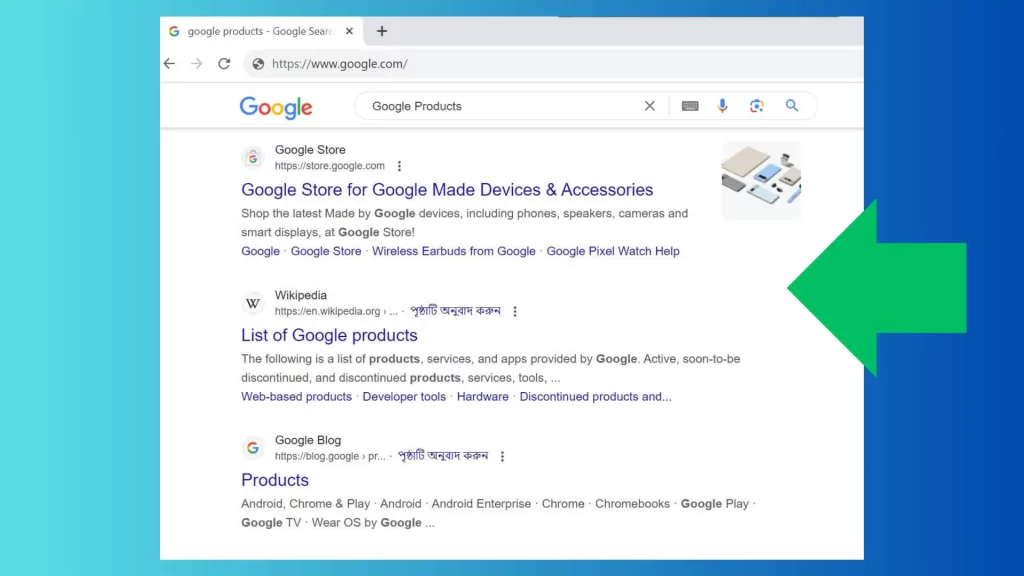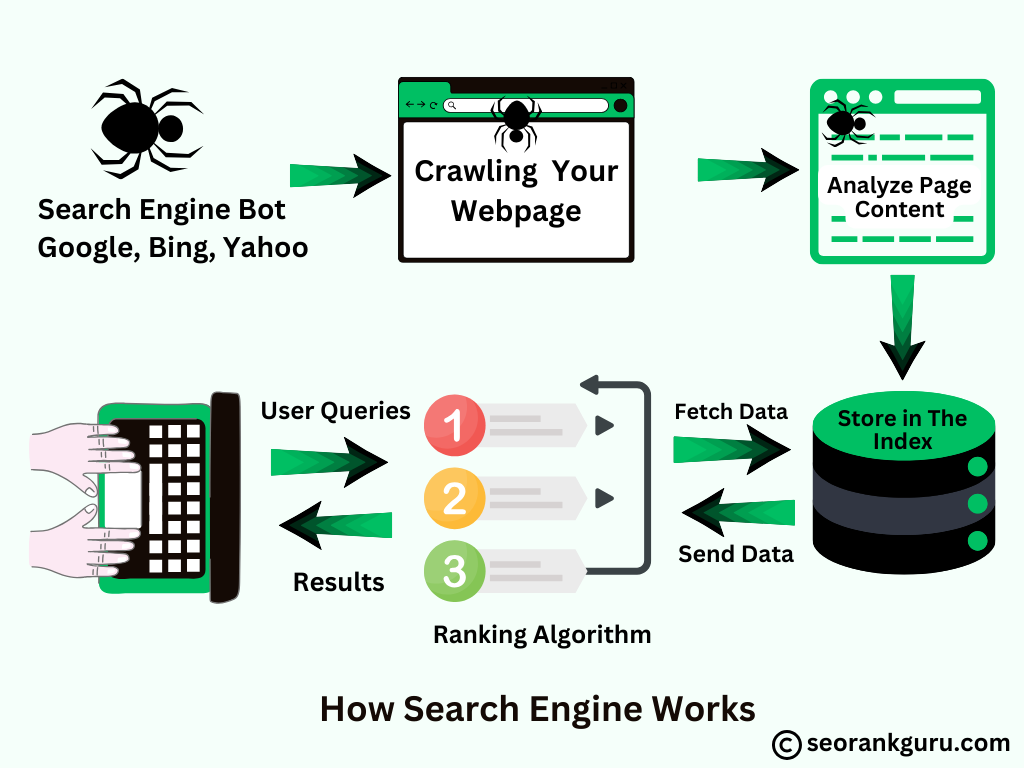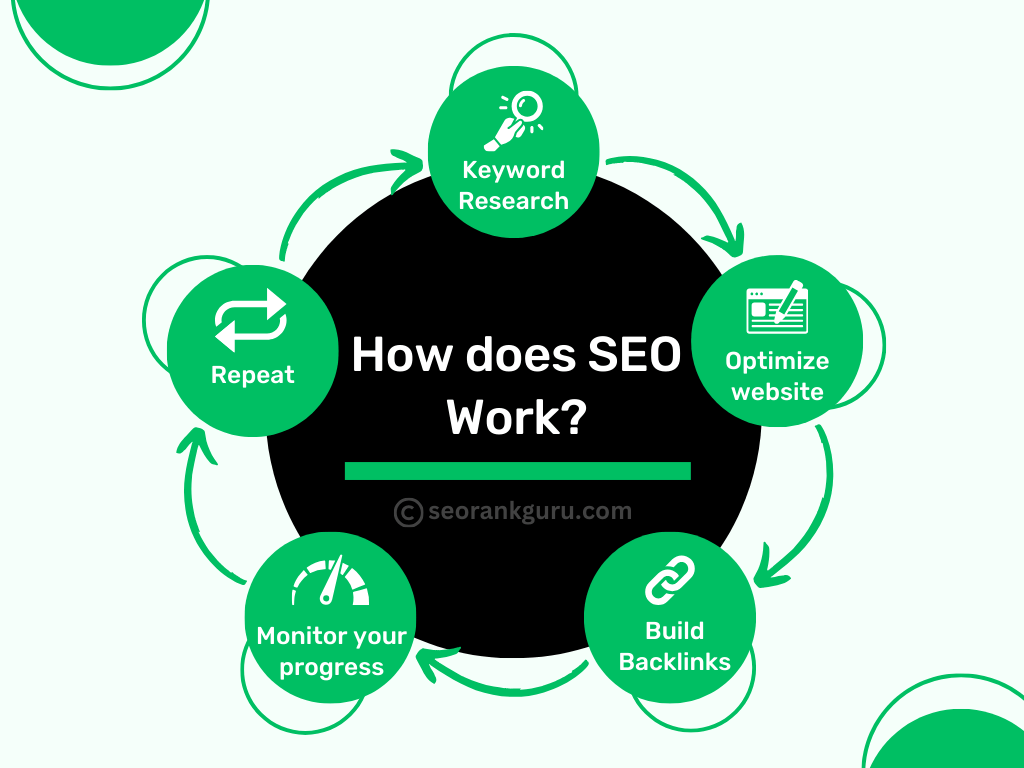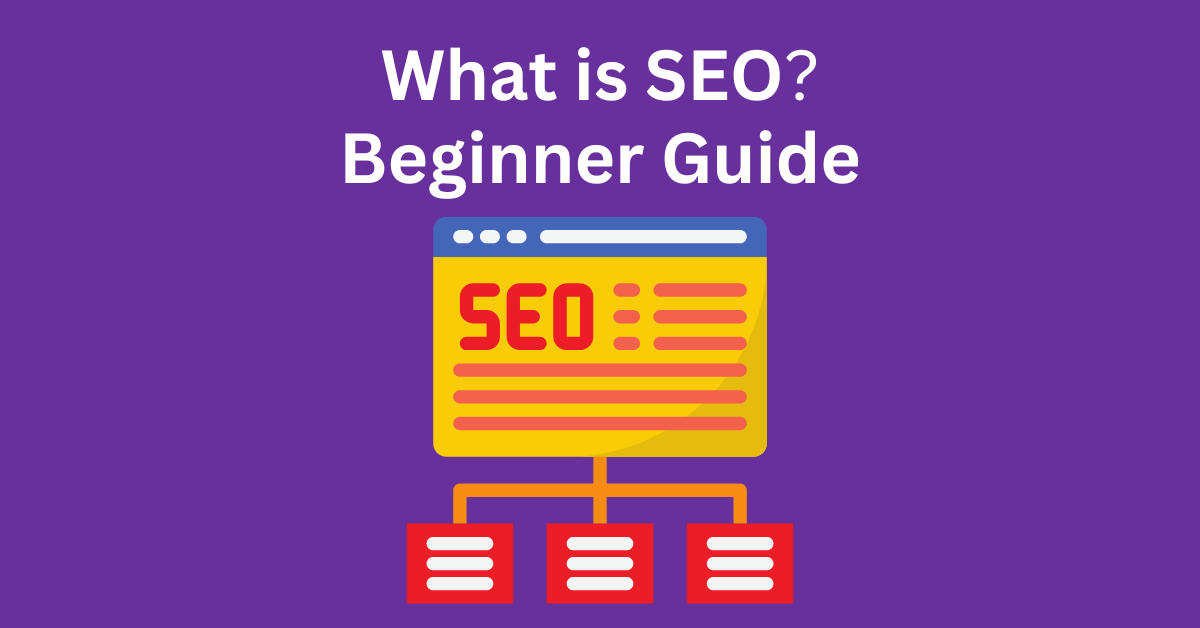Are you a businessman or a student/working professional eager to learn about SEO?
I assume you are new to SEO and want to learn the basics or are considering hiring an experienced SEO expert. In either case, understanding the fundamentals of SEO is crucial.
In this article, we will explore the basics of SEO and you will hopefully gain comprehensive insights into SEO.
Let’s get started…
What is SEO?
Simply put, SEO is the method of ensuring your website appears prominently in search engines (Google, Yahoo, Bing, etc.) among millions of others. Its full form is search engine optimization.
Suppose you have a website, but if it isn’t visited by potential customers, you won’t reap any business benefits. Search engine optimization (SEO) provides an organic method to improve your website’s ranking on the search engine results page.

Example of search engine result page SERP
How Do Search Engines Work?
To understand SEO more easily, let’s take a look at how search engines work.
Search engines use complex algorithms to determine the relevance and usefulness of a website in relation to a user’s search query.
When a user types a query into a search engine, the search engine’s algorithm begins by analyzing the keywords in the query and comparing them to the content on websites that have been indexed by the search engine.
The algorithm then ranks the websites based on how well they match the query and how useful the information on the website is likely to be for the user.

Example of How Search Engine Works
For example, if a user types “best Italian restaurants in New York City” into a search engine, the algorithm will begin by looking for websites that have information about Italian restaurants in New York City. It will then use a variety of ranking factors, such as the relevance of the website’s content to the query, the quality and authority of the website, and the number and quality of other websites linking to the website, to determine which websites should be listed first in the search results.
Additionally, search engines take into account the user’s location, browsing history, and other factors to personalize the results and provide the most relevant information to the user.
Search engines also use techniques such as natural language processing (NLP) and machine learning (ML) to understand the intent behind a query and to provide the most useful and relevant results. With the increasing amount of data available on the web, search engines like Google are constantly updating their algorithms to become more accurate, relevant, and useful for the user.
How does SEO Work?
SEO works by optimizing websites to rank higher on search engine results, improving visibility, and attracting organic traffic through relevant keywords and quality content.
Here is an example of how SEO works:
- Keyword Research: The first step in SEO is to research and identify the keywords that people are using to find products or services related to your business.
- Optimize website: Once you have a list of keywords, you can optimize your website’s content and structure to include those keywords in the titles, headings, and body text of your pages. You can also optimize your images and other media with keywords in their file names and alt tags.

Example of “What Does SEO Work”
- Build backlinks: Backlinks are links from other websites that point to your website. Search engines view backlinks as a vote of confidence in your website, so the more backlinks you have, the higher your website will rank. You can build backlinks by submitting your website to directories, creating high-quality content that other websites will want to link to, and reaching out to other websites to ask for a link.
- Monitor your progress: Use tools like Google Analytics and Google Search Console to monitor your website’s traffic, search engine rankings, and backlinks. Use this data to adjust your SEO strategy and make changes to your website as needed.
- Repeat: SEO is an ongoing process, as search engines are constantly updating their algorithms and new websites are being created. So, you need to repeat all the above steps regularly to maintain or improve your website’s ranking.
Keep in mind that SEO is a long-term strategy and it takes time to see results.
However, by following SEO best practices and making consistent efforts, you can improve your website’s visibility and drive more traffic to your site.
Types of SEO:
There are several different types of SEO that can be used to achieve this goal, including on-page SEO, off-page SEO, technical SEO, and local SEO.
- On-page SEO: On-page SEO refers to the optimization of the content and structure of a website in order to improve its relevance and authority for specific keywords or phrases. This includes optimizing the website’s title tags, meta descriptions, header tags, and content to ensure that it is properly indexed by search engines and that it is relevant to the user’s search query.
- Off-page SEO: It refers to the optimization of a website’s backlinks and social signals in order to improve its authority and visibility on search engines. This includes building high-quality backlinks from reputable websites, as well as engaging with users on social media platforms to increase the website’s visibility and reach.
- Technical SEO: Technical SEO refers to the optimization of a website’s technical infrastructure in order to improve its visibility and ranking on search engines. This includes optimizing the website’s code, ensuring that it is mobile-friendly and responsive, and ensuring that it loads quickly and reliably.
- Local SEO: It refers to the optimization of a website for local search queries, such as “restaurants near me” or “plumbers in my area.” This includes optimizing the website’s content and meta tags for local keywords, as well as building local backlinks and citations to improve the website’s visibility and ranking for local search queries.
Overall, SEO is a complex and ongoing process that requires a combination of on-page, off-page, technical, and local optimization techniques in order to achieve the best results.
SEO Strategies Type:
SEO strategies can be broadly categorized into three types: Black Hat, Gray Hat, and White Hat.
- Black Hat SEO refers to tactics that are used to manipulate search engine rankings in a way that is against the search engine’s terms of service. These tactics can include keyword stuffing, hidden text, and link farms. These tactics can result in penalties or even a ban from the search engine.
- Gray Hat SEO refers to tactics that are not necessarily against the search engine’s terms of service but may be considered unethical or manipulative. These tactics can include buying links or cloaking. These tactics may not result in a penalty, but they can still be risky.
- White Hat SEO refers to tactics that are used to improve search engine rankings in a way that is in line with the search engine’s terms of service. These tactics can include creating high-quality content, optimizing meta tags, and building backlinks from reputable websites. White Hat SEO is considered the most ethical and long-term approach to SEO.
Note: In my opinion, it’s best to stick with white-hat SEO. If you use black hat or gray hat SEO, you might get penalized by search engines.
Why is SEO so Important?
SEO is the practice of optimizing a website or online content to improve its visibility and ranking in search engine results pages (SERPs).
Here are a few reasons why SEO is so important and who will benefit from it.
- The higher your website ranks, the more visible it becomes to potential customers.
- This means that when people search for keywords related to your business, your website will appear at the top of the search engine results page.
- SEO helps to attract more organic traffic to your website, which in turn can lead to more leads and sales.
- A well-optimized website can also help build your brand and establish your business as a leader in your industry.
- To ensure your website is optimized for search engines, it is recommended to work with an experienced SEO professional or agency.
- SEO provides a higher return on investment compared to traditional advertising methods.
- It helps to improve the user experience by making your website easy to navigate and user-friendly.
- By optimizing your website for search engines, you are providing valuable information to potential customers and establishing trust with them.
- SEO can help to improve the credibility of your website and build trust with your target audience.
- Having a well-optimized website can help you stay ahead of the competition and be more easily found by potential customers.
- By utilizing local SEO tactics, you can target customers in specific geographic locations and increase the likelihood of attracting local traffic.
- A well-optimized website can also improve your website’s loading speed and performance, making it easier for visitors to find what they are looking for.
- In the long term, SEO provides a sustainable source of traffic and leads, whereas other advertising methods may only provide temporary results.
- SEO can also help to provide valuable insights into your target audience, allowing you to tailor your marketing strategies for better results.
In conclusion, SEO is an essential component of any digital marketing strategy as it helps to improve visibility, attract more traffic, and increase leads and sales.
Who will Benefit from SEO?
SEO can benefit businesses and organizations of all sizes, including small businesses, large corporations, and non-profits.
Small Business:
A small business that sells handmade jewelry can benefit from SEO by appearing at the top of the SERPs when people search for “handmade jewelry.” This can help the business to get more visibility and increase its sales.
Here is a list of some Small Business:
- Local service-based businesses such as hair salons, plumbing services, and pet grooming businesses
- E-commerce businesses selling physical or digital products
- Restaurants and food-based businesses
- Health and wellness businesses such as spas, chiropractors, and fitness studios
- Home-based businesses and freelancers
- Professional services such as accountants, lawyers, and financial advisors.
Large Corporations:
Large corporations can also benefit from SEO by appearing at the top of the SERPs for their products and services.
For example, a company that sells cars can benefit from SEO by appearing at the top of the SERPs when people search for “new cars.” This can help the company to get more visibility and increase its sales.
Here is a list of large corporations that have benefited from SEO:
- Coca-Cola
- Nike
- Samsung
- Procter & Gamble
- Walmart
- Toyota
- McDonald’s
These corporations have implemented effective SEO strategies to improve their visibility in search engine results pages and attract more organic traffic to their websites. As a result, they have increased their brand exposure and online revenue.
Non-profit Organization:
Non-profit organizations can also benefit from SEO by appearing at the top of the SERPs for their cause or mission.
For example, a non-profit that works to protect endangered species can benefit from SEO by appearing at the top of the SERPs when people search for “endangered species” This can help the non-profit to get more visibility and increase its donations.
Here is a list of non-profit organizations that can benefit from SEO:
- Environmental advocacy groups
- Health and wellness charities
- Animal welfare organizations
- Education foundations
- Community development corporations
- Human rights organizations
- Religious institutions
- Disaster relief agencies
- Arts and cultural organizations
- Political advocacy groups.
By optimizing their online presence, these non-profit organizations can increase visibility, attract more donors, and achieve their goals more effectively.
Individual Professionals:
Individuals such as doctors, dentists, lawyers, and other professionals can also benefit from SEO.
For example, a doctor who specializes in pediatrics can benefit from SEO by appearing at the top of the SERPs when people search for “pediatrician.” This can help the doctor to get more visibility and attract new patients.
Similarly, a dentist who specializes in cosmetic dentistry can benefit from SEO by appearing at the top of the SERPs when people search for “cosmetic dentist.” This can help the dentist to get more visibility and attract new patients.
There are several types of professionals who can benefit from SEO (Search Engine Optimization), including:
- Doctors
- Dentists
- Lawyers
- Accountants
- Architects
- Engineers
- Optometrists
- Veterinarians
- Chiropractors
- Psychologists
By optimizing their websites and online presence, these professionals can improve their visibility and attract more clients through search engines like Google.
SEO Earnings with Stats:
The amount of money that a person or organization can make from SEO can vary greatly depending on a number of factors such as location, experience, and the type of client or business they are working with. However, here is an estimate of the potential earnings for each of the types of individuals and organizations listed above:
- Digital marketing agencies: Agencies can charge clients a monthly retainer or a project-based fee for SEO services. According to a survey by Clutch, the average hourly rate for SEO services provided by agencies is around $150 per hour.
- Freelance SEO consultants: Freelance SEO consultants can charge clients an hourly rate or a project-based fee for their services. According to a survey by Upwork, the average hourly rate for SEO services provided by freelancers is around $80 per hour.
- Businesses: Businesses that invest in SEO can see an increase in website traffic and revenue, which can lead to significant financial gains. According to a survey by BrightEdge, businesses that invest in SEO can see an average of 15% increase in revenue.
- E-commerce sites: E-commerce sites can see an increase in sales and revenue as a result of improved search engine rankings and increased website traffic. According to a survey by BigCommerce, e-commerce businesses that invest in SEO can see an average of 30% increase in revenue.
- Non-profit organizations: Non-profit organizations can see an increase in donations and support as a result of improved search engine rankings and increased website traffic.
- Educational institutions: Educational institutions can see an increase in enrollment and support as a result of improved search engine rankings and increased website traffic.
Please note that the above figures are estimates and not specific guarantees of income. Additionally, the figures will vary depending on the size and type of business, the location, and the level of competition in their industry.
Best way to learn SEO:
Here are a few steps you can take to start learning SEO:
- Understand the basics: Start by familiarizing yourself with the basics of SEO, such as keyword research, on-page optimization, and link building. You can find many resources online, such as Moz’s Beginner’s Guide to SEO, Google’s SEO Starter Guide, and Neil Patel’s blog, that provide a good introduction to these concepts.
- Practice: One of the best ways to learn SEO is to practice it. Create a website or blog, and optimize it for search engines. This will give you hands-on experience with the concepts you’ve learned and help you understand how they all fit together.
- Read industry blogs and publications: Keep yourself updated with the latest SEO news, trends, and best practices by reading industry blogs and publications. Some popular blogs in the industry include Moz, Search Engine Land, and Ahrefs blog.
- Join SEO communities and forums: Participate in SEO communities and forums, like Reddit’s /r/SEO, where you can ask questions, share your knowledge, and get feedback on your work.
- Learn with professionals through online courses: There are many online SEO courses available. Some popular ones include SEO That Works by Brian Dean, SEO Training Course by Ahrefs, and SEO Mastery course by Moz.
- Analyze the SEO of existing websites: Study the SEO of existing websites to understand how they’re optimizing for search engines. You can use tools like Ahrefs or SEMrush to analyze the backlinks, keywords, and content of a website.
Keep in mind that SEO is a constantly changing field, so it’s important to stay up-to-date with the latest trends and best practices.
In conclusion, Search Engine Optimization (SEO) is a vital aspect of online marketing.
It is the process of optimizing a website or online content to improve its visibility and ranking on search engines.
This can be done by researching keywords, incorporating them into website content, meta tags, and other elements, creating high-quality content, backlinking, and using other techniques that are designed to make a website more relevant and attractive to search engines.
By implementing these strategies, a website can increase its visibility and attract more traffic, which can lead to more customers and sales for businesses.
Whether you are running an e-commerce website, a local restaurant, or a doctor’s clinic, SEO can help you reach more potential customers and achieve success in the online world.


